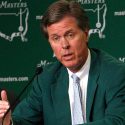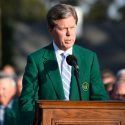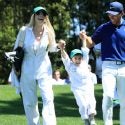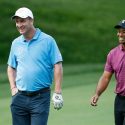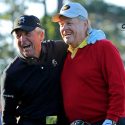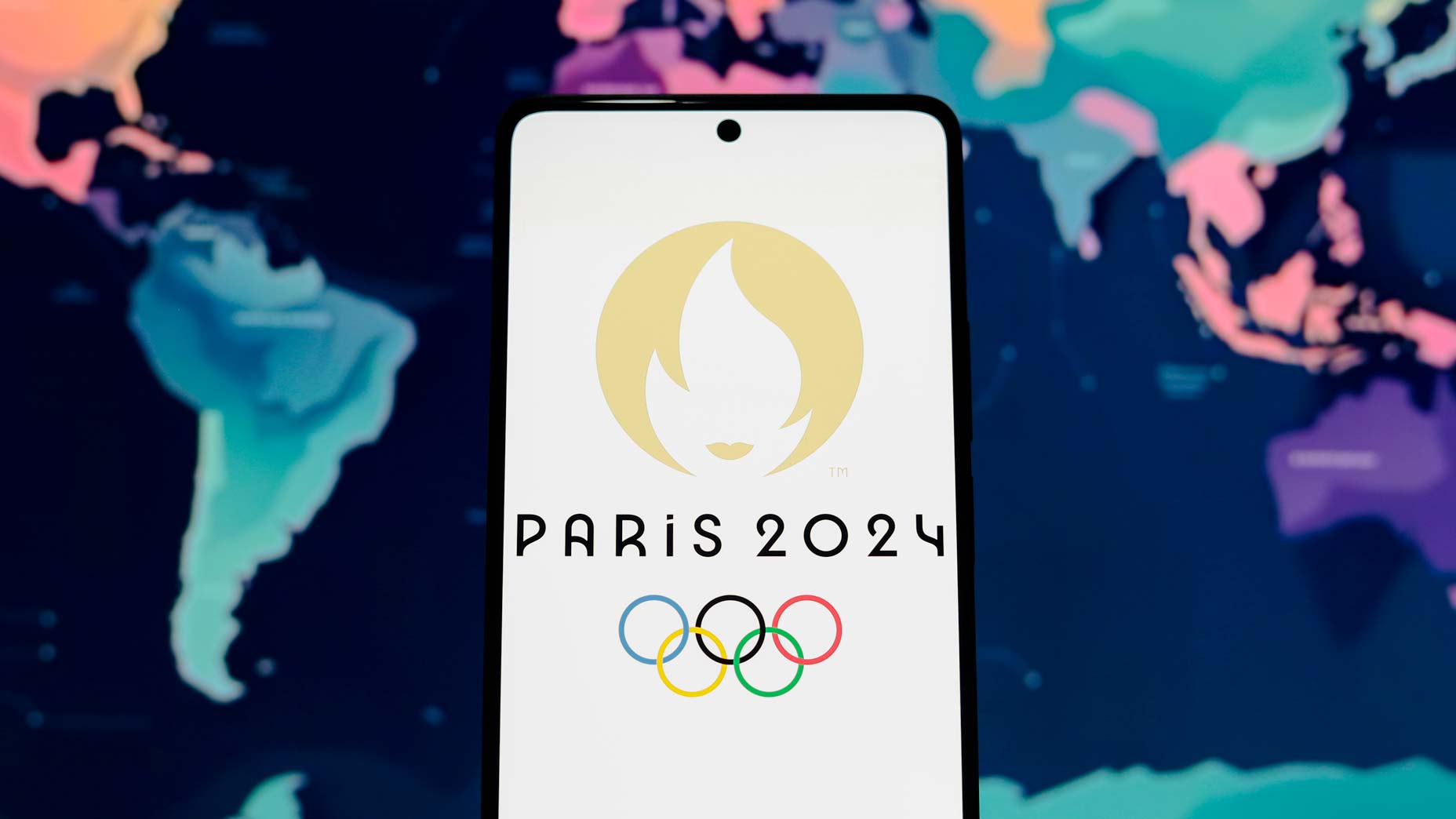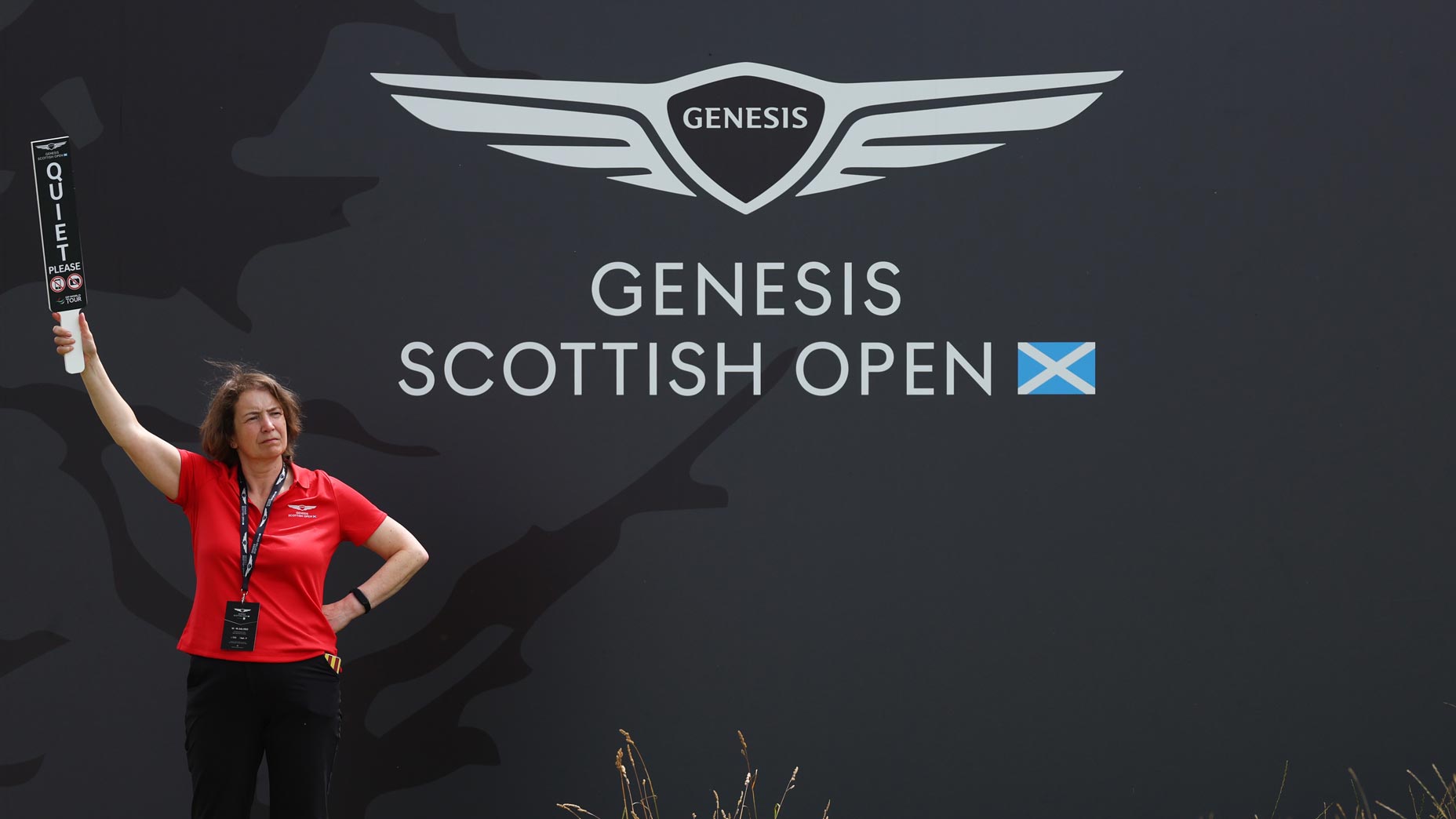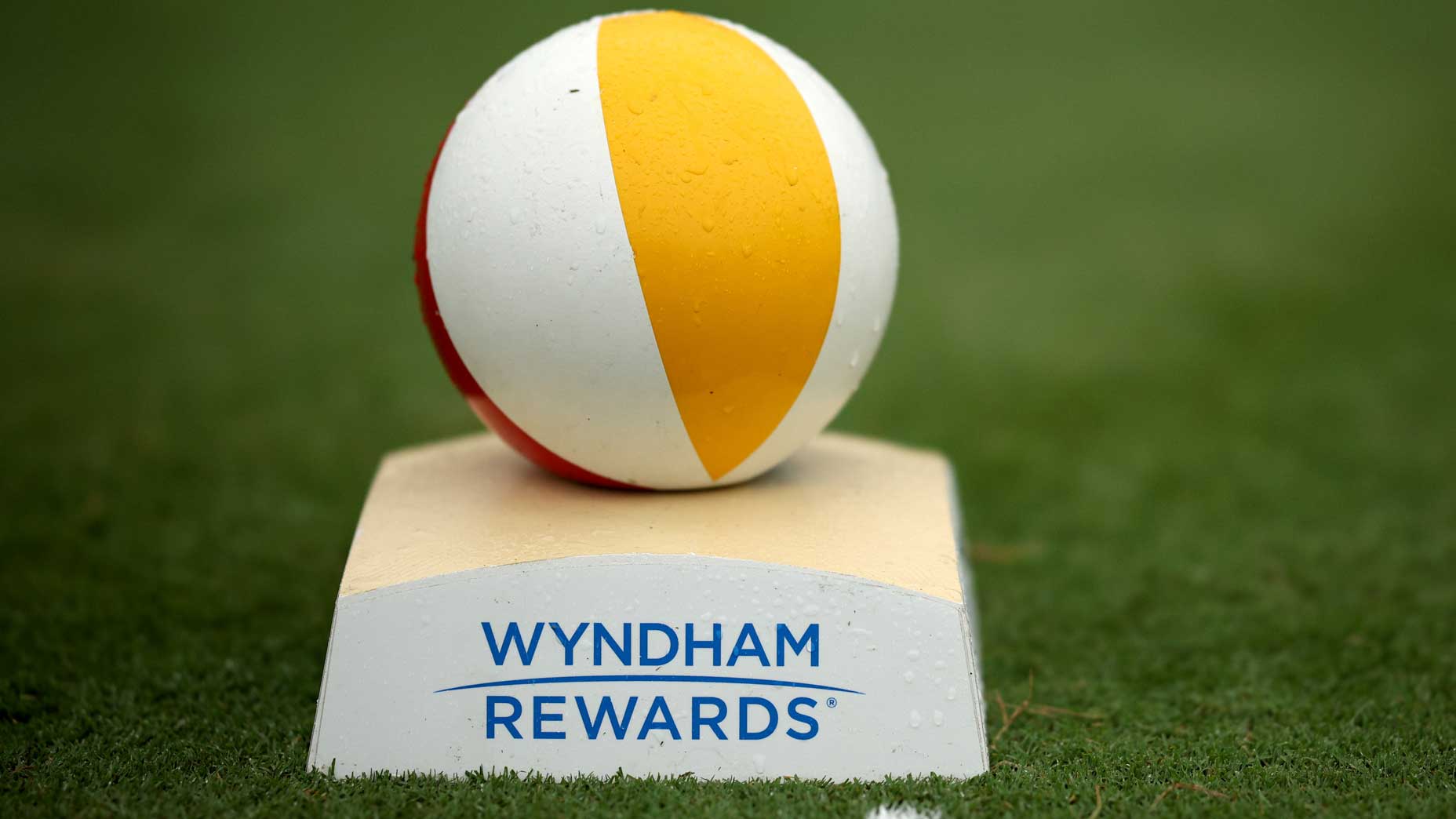 2024 Wyndham Championship: How to watch, TV coverage, streaming info, tee times
2024 Wyndham Championship: How to watch, TV coverage, streaming info, tee times
The Masters That Never Was, Part IV: Chairman Ridley’s big news, and Reed makes new fans
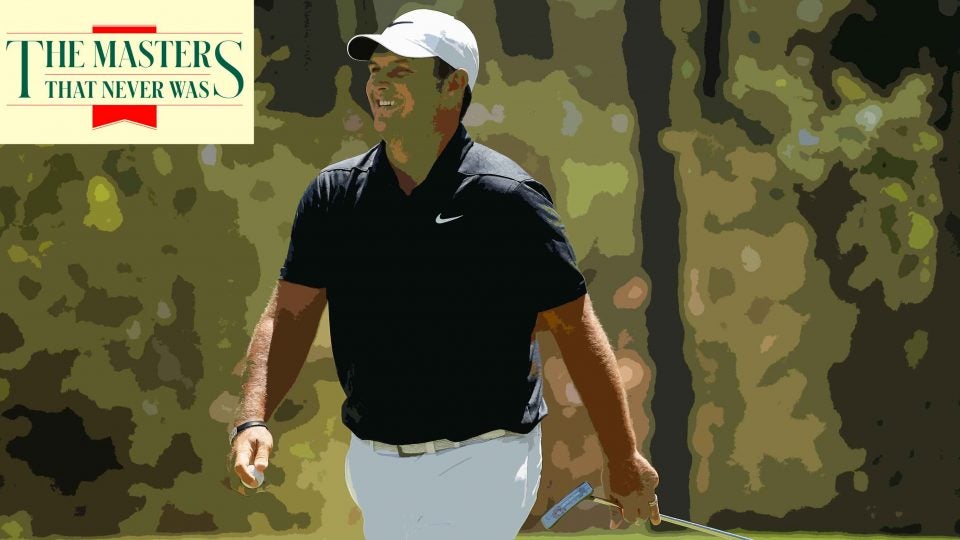
Ed. note: This is the fourth installment of The Masters That Never Was, a fictional account of how the Masters Tournament might have played out had it been conducted this week at Augusta National Golf Club.
New to this series? Click here for previous installments: DAY 1 | DAY 2 | DAY 3
*****
AUGUSTA, Ga. — Fred Ridley is the answer to a trivia question: Who was the last U.S. Amateur champion not to turn pro? Much like his idol Robert Tyre Jones — Bob to his friends, Bobby to an adoring public — Ridley chose law as his profession but has made Augusta National Golf Club his abiding passion. The eighth chairman in the club’s history regularly references Jones in his traditional Wednesday press conference and this year was no different.
“Ladies and gentlemen of the press, thank you for being here,” Ridley began.
“Last night, as I thought of what I wanted to say before you, I was reading through the wise words of our founder, which always inspire me. I came across this quote: ‘If fame can be said to attach to one because of his proficiency in the inconsequential performance of striking a golf ball, what measure of it I have enjoyed has been due in large part to O.B. Keeler and his gifted typewriter.’ It made me reflect upon the club’s relationship with the press. Indeed, your predecessors played an integral role in the creation and growth of Augusta National and our annual invitational. Grantland Rice helped found the club and without his tireless promotion it might not have survived the Great Depression. Herb Wind coined the phrase ‘Amen Corner.’ Dan Jenkins, Jim Murray and many others did much to add to the legend of the Masters.
“So, today, I’d like to offer an apology for the onerous restrictions the club has put upon the modern sportswriter. Effective immediately, all accredited media shall be allowed to use their mobile devices on the golf course, so you can stay connected with your readers and help tell the story of our championship on your social-media feeds. You deserve our trust and the fans deserve your content. We hope you will accept our apologies. I would now be delighted to take your questions.”
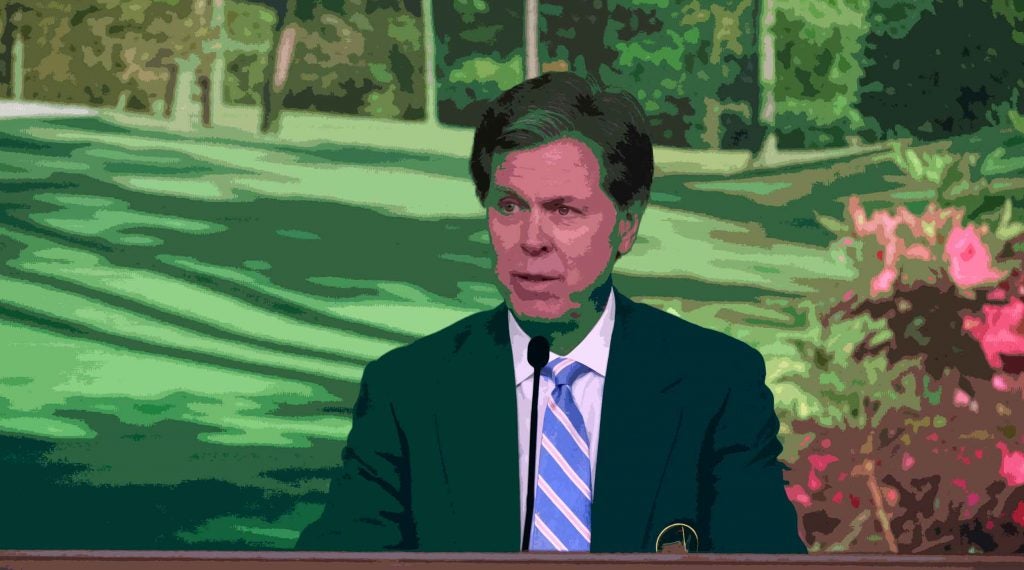
Seated in the front row, Steve DiMeglio of USA Today raised his hand to shoulder height. Any higher is a breach of decorum, not that DiMeglio typically worries about such things.
“Mr. Chairman, because of your playing background it was expected — or at least hoped — that you would return the golf course to its original design philosophies,” DiMeglio said. “But last night I slept in my car in the driveway of Tiger’s rental house so I could get an exclusive from him and he said, and I quote, ‘The first cut this year is as thick and luscious as Fred Ridley’s hair.’ End quote. Your response, sir?”
“Well, Steve, some of the credit must go to Tommy Fleetwood, who has a new endorsement deal for high-end hair product and he dropped off a sample late last week. As for the course, like all chairmen, I am indebted to my predecessors. To make radical changes to our presentation of the playing field now would be a repudiation of their visions, however misguided they may have been. I believe we need to let the natural aging process play out, which will then allow me further latitude to make changes. If you know what I mean.”
The collegial question-and-answer session continued for another 40 minutes. At the end, Ridley motioned for two GOLF.com reporters slouched in the back row to come see him at the dais. “Gents, I have been enjoying your daily dispatches,” he said. “I would be pleased if you would join me for a chat in my office.”
Ridley led a procession of carts across the Augusta National campus, ultimately stopping in the middle of a giant tunnel. “Let’s take the secret elevator, shall we?” he said, unable to swallow a grin.
It opened up directly into his office, which looks like a museum, right down to the imposing painting of Bobby Jones painted by former member Dwight D. Eisenhower. But the chairman fiddled with his iPhone and a most unexpected sound began playing through unseen speakers: Bill Withers’s honeyed voice.
“We lost a giant this week,” Ridley said. “When my swing gets a little off I hum Ain’t No Sunshine and my tempo is magically restored.”
He placed a glass atop his expansive desk. It was etched:
1975
FRED RIDLEY
EAGLE—8TH HOLE
“Would you like water or something with a little more hair?” Ridley asked, nodding toward a bottle of single-malt Macallan on a shelf behind him. “It was a gift from Tiger, after the 2013 tournament,” he said. Those freighted words hung in the air for a few beats.
“Gentleman, the reason I asked you here today is…”
Ridley was interrupted by his secretary buzzing in on the intercom: “Mr. Chairman, Roger Goodell on the line.” Ridley put the call on speakerphone.
“Rodge, how the hell are ya?”
“Good, Freddy. I hate to bug you again but I need four more tickets for Berckmans. Some old frat buddies just blew into town.”
“Well, I’m trying to be fair here, Roger. The other members…”
“How about four tickets to Super Bowl LV, 50-yard line?”
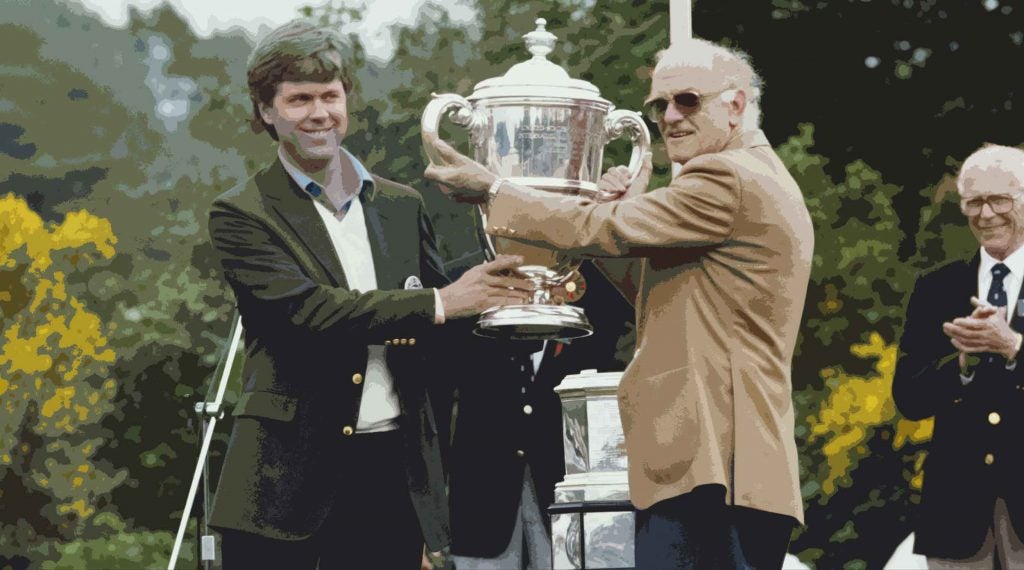
Ridley pressed an intercom button and said, “Margaret, sorry for the intrusion. Mr. Goodell will be calling you presently. Kindly accommodate him as best you can.”
Ridley turned his attention back to the reporters. “Fellas, how much do you know about the 1929 U.S. Open?”
“When Bobby Jones was knocked out in the first round?”
“Yes. Yes indeed! I once asked Billy Payne that question and he said, interestingly, that he thought that was where Bobby Jones completed the Grand Slam. Anyway, it is common knowledge that after his loss Bob played a round at Cypress Point, giving him his first exposure to the work of Dr. MacKenzie. What few others seem to be aware of is that later that week Marion Hollins invited Bob to be part of an exhibition at Pasatiempo, which, like Cypress, Ms. Hollins helped bring to life. Dr. MacKenzie, having built a home at Pasatiempo, walked along and chatted throughout the round with Bob. The kinship born on that day ultimately led to their collaboration here at Augusta National. Without Marion Hollins, that may have never happened. So, as a way to pay tribute to Ms. Hollins we have decided…”
Ridley’s intercom buzzed with a notification from Margaret.
“Mr. Ridley, Madame Secretary on line one.”
Ridley, manners impeccable as per usual, raised an index finger and motioned for the reporters to sit tight. He said, “Condi, always a pleasure. How are you?”
“Couldn’t be better ,” she said. “The provost of Stanford and her husband just came to town and I want to get them on-site parking. Can you put them on the list at the Magnolia entrance? I’d really appreciate it. All my best to Betsy and the girls.”
The call ended and Ridley pressed the intercom button.
“Margaret, sorry for the intrusion. Ms. Rice will be calling you presently. Kindly accommodate her as best you can.”
Ridley continued with his story: “As I was saying, to honor Ms. Hollins and all of the great ladies in the game, this year, from Nov. 9-15 we will be hosting the first annual Women’s Masters. It is long overdue. The trophy will be known as the Hollins Cup. I want you gents to have the story first because…”
The intercom buzzed.
“Secretary Tillerson, Mr. Ridley.”
Up went an index finger.
“Rex, you got things under control at the range?”
Many of the club members are given jobs for the week of the tournament and Rex Tillerson had returned to his old post, monitoring ball distribution at the driving range.
“I’d say things are orderly here, Fred, as per usual. This request is a tad awkward. Got a call from the Vice President’s office, asking for our members’ discount code in the merchandise tent? I didn’t even know we had such a thing.”
“In fact, we do. I believe it’s POINTOFABAYONET. But Margaret has the details.”
The call ended. The chairman pressed the intercom.
“Margaret, sorry for the intrusion. Mr. Tillerson will be calling you presently. Kindly accommodate him as best you can.”
He returned his attention to the scribes seated before him. “I didn’t say anything about the Women’s Masters during the press conference because I wanted you fellas to have it first. It’s my way of making amends. Margaret has a packet for you with all the details. Once your story posts we’ll send out a full release. Is that agreeable?”
Ridley offered a handshake, ending the discussion. As the reporters walked down the hallway, toward the exit, the chairman could be heard crooning alone in his office, “Ain’t no sunshine when she’s gone/It’s not warm when she’s away/Ain’t no sunshine when she’s gone…”
ADVERTISEMENT
*****
James Baker, patrician Texas oil man, and Patrick Reed, spunky Texas golfer, made for an odd couple. Ben Crenshaw, Texas golf legend in a long series of them, had put them together. In introducing them, on the putting green at Champions, Crenshaw said, “Pat, Mr. Baker here is going to help you like W. helped me at the ’99 Ryder Cup.” George W. Bush, Baker’s old friend, had famously offered Crenshaw’s sagging Ryder Cup team at The Country Club a remember-the-Alamo speech for the ages. Reed was looking for a public-perception makeover.
It was Baker who had the idea to have a reporter caddie for Reed in the Par-3 tournament. And the one he had handpicked was somebody who had not been seen in some time, Josh Dutra, on special assignment for GOLF.com. Previously, Dutra had been a reporter at the Review-American in St. Petersburg and then went to work for the iconic golfer Tree Tremont, who was not playing in the 2020 Masters after breaking his hand while doing post-hurricane relief work in the Bahamas. Instead, Tree would be in the CBS broadcast booth with Nick Faldo and Jim Nantz.
“Patrick, I have good news and better news for you,” Dutra said to Reed upon meeting him. “I’ve arranged for you to play the Par-3 tournament with Gary and Jack.”
“I’m gonna be more nervous than a long-tailed cat in a room full of rocking chairs,” Reed said. He cracked his neck to relieve some tension.
“The only thing you have to do is pay attention to how they go about their business,” Dutra said. “Then remember it for the rest of your life.”
“And don’t win the thing,” Reed said.
“And don’t win the thing.”
No player has ever won the Par-3 tournament and then the Masters itself, one of the sports world’s great curses.
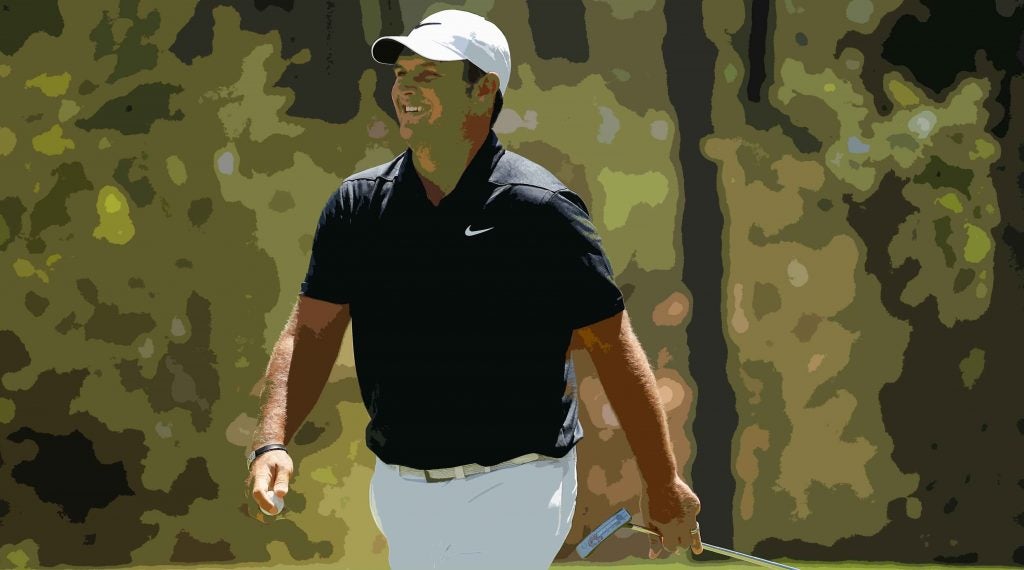
*****
The only threesome that got more attention than Reed-Nicklaus-Player on Wednesday was Mickelson-Woods-Ogletree. Andy Ogletree, the reigning U.S. Amateur champion, appeared startled by what Mickelson was saying on the 1st tee, as well as what he was wearing over his polo: a blazer made of t-shirt material with ¾ length sleeves, which, as of that morning, Mickelson had begun selling on his website, calling it The Slouchy.
“OK, Andy, here’s the game: Tiger and me, worst ball, against you,” Mickelson said.
“Worse ball?”
“If I make a 3 and Tiger makes a 4, your 3 beats our 4. Worst ball.”
“What if I make a 2?”
“Yeah, what does happen in that situation, Tiger?”
“He wins $1,000. One K per hole. Halves carry. Birdie wins pay double. Aces pay 10.”
“You could make a lot of money here, Andy.”
“Or I could lose a lot of money I don’t have. I’m just an amateur — I had to borrow money from my girlfriend to tip the fellas in the Crow’s Nest!”
“Hey, you want in or not?”
Ogletree mumbled something unintelligible.
Mickelson turned to Woods and said, “Got him!”
Woods said to Mickelson, “Seriously, though, did you see the Vegas line on our little match?”
“No,” Mickelson said. “I don’t pay attention to that sort of thing.”
*****
The weather was perfect. There was no wind. Reed didn’t miss a shot over the first eight holes, including an ace at No. 5. Through eight holes he was eight under. Player and Nicklaus had kept their golf balls dry for all eight holes. When Reed holed out on No. 8 the two legends bowed in his direction and said, “We’re not worthy.”
Reed was standing there silently when Dutra whispered, “Now you say something about them.”
Reed made an enthusiastic nod and said loudly enough for every fan to hear, “Hey, I only trail you two by 26 combined majors!”
“Laddie, don’t forget my nine senior majors and Jack’s eight!”
Nicklaus grimaced.
Reed was having the time of his life. Or he made it seem that way.
On the last hole, as Reed made his downswing, Nicklaus and Player both made crazy shrieking sounds. Reed flinched and topped the ball, a little grounder that splashed and died. The old-timers were cackling.
“We had to do it, mon,” Player said. “We couldn’t let you win this thing!”
“Right, right,” Reed said. “Thank you! But I would have had to DQ myself anyway. My caddie switched balls on me after the 8th hole, and this one was last year’s model. I noticed the different markings when I was at the top of my swing. That’s why I flinched on that shot.”
“You didn’t hear our shrieking?”
“What are you talking about?” Reed asked.
Jack looked at Gary. Gary looked at Jack.
“Got ya!” Reed said.
The crowd laughed. Reed’s reputation was making a comeback.
As for the Par-3 tournament, it was won by Andy Ogletree, with a score of 22.
“What a shame,” Mickelson said to him. “You would have taken us for $6K.”
Woods, with his son serving as caddie, posted a smooth 24, two strokes better than Mickelson. As Woods signed autographs, a fan asked what the wager had been. “Remember that little match we had at Shadow Creek?” Tiger said. “Let’s just say me and Phil are now even. Except we’re really not, because around here only one score matters, and it’s counted in jackets. Five-three, for now. That could change, come Sunday. Right, Phil?”
Said Phil, signing himself, “Huh?”
The Round 1 recap from The Masters That Never Was will be published on GOLF.com on Thursday evening.
To receive GOLF’s all-new newsletters, subscribe for free here.
ADVERTISEMENT


